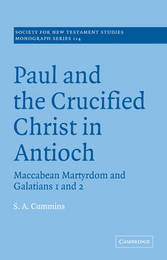
|
Paul and the Crucified Christ in Antioch: Maccabean Martyrdom and Galatians 1 and 2
Paperback / softback
Main Details
| Title |
Paul and the Crucified Christ in Antioch: Maccabean Martyrdom and Galatians 1 and 2
|
| Authors and Contributors |
By (author) Stephen Anthony Cummins
|
| Series | Society for New Testament Studies Monograph Series |
|---|
| Physical Properties |
| Format:Paperback / softback | | Pages:308 | | Dimensions(mm): Height 215,Width 139 |
|
| ISBN/Barcode |
9780521037174
|
| Classifications | Dewey:227.406 |
|---|
| Audience | | Professional & Vocational | |
|---|
| Illustrations |
Worked examples or Exercises
|
|
Publishing Details |
| Publisher |
Cambridge University Press
|
| Imprint |
Cambridge University Press
|
| Publication Date |
2 July 2007 |
| Publication Country |
United Kingdom
|
Description
The so-called 'Antioch Incident' - the confrontation between the apostles Peter and Paul in Galatians 2.11-21 - continues to be a source of controversy in both scholarly and popular estimations of the emergence of the early Church and the development of Pauline theology. Paul and the Crucified Christ in Antioch offers an interesting interpretation of Paul's account of and response to this event, creatively combining historical reconstruction, detailed exegesis, and theological reflection. S. A. Cummins argues that the nature and significance of the central issue at stake in Antioch - whether the Torah or Jesus Christ determines who are the people of God - gains great clarity and force when viewed in relation to a Maccabean martyr model of Judaism as now christologically reconfigured and redeployed in the life and ministry of the apostle Paul.
Author Biography
S. A. Cummins is Associate Professor of New Testament at the Canadian Theological Seminary, Regina, Saskatchewan. He has taught both in Canada and the UK, and has published in academic journals.
Reviews'The exegetical skill and insight Cummins brings to important issues is considerable, and the implications of his conclusions are potentially far reaching ... a challenging work, and one which should stimulate considerable debate in scholarship.' Neotestamentica
|